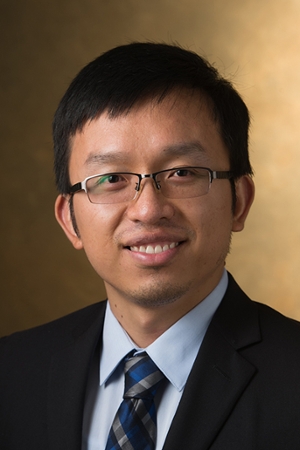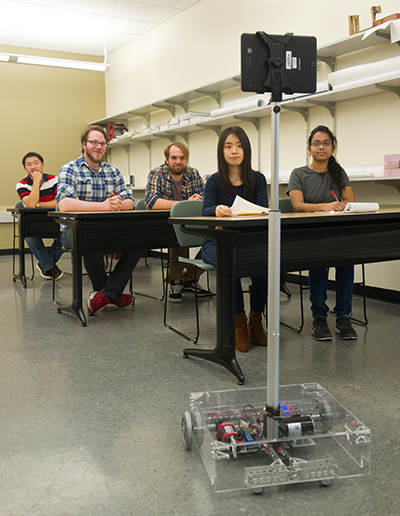 The research title says it all: “Improve Remote Education Using Telepresence Robots with Social Capacities.” The associated possibilities for educational advancement are endless.
The research title says it all: “Improve Remote Education Using Telepresence Robots with Social Capacities.” The associated possibilities for educational advancement are endless.
Southern Illinois University Edwardsville School of Engineering’s Mingshao Zhang, PhD, assistant professor in the Department of Mechanical Engineering, continues his development of a remote educational robotic system that is easy-to-use and low cost for the benefit of learners worldwide.
“A telepresence robot allows people to participate in video conferences on a moveable platform from a remote location,” Zhang explained. “Such systems, which were originally designed to promote social interaction between people, have become popular in various applications. But, few studies have examined telepresence robots in the classroom. My research seeks to better identify the possible effects such approaches have on student learning and perceptions of instructor credibility.”
As a 2018-19 faculty fellow with the SIUE Center for Science, Technology, Engineering and Mathematics (STEM) Research, Education and Outreach, Zhang is collaborating with pedagogical experts to meet his research goals of increasing instructor credibility by enhancing usability and maximizing student learning outcomes.
increasing instructor credibility by enhancing usability and maximizing student learning outcomes.
“Dr. Zhang’s research on the use of telepresence robots will advance knowledge in the rapidly growing area of online learning,” said SIUE STEM Center Director Sharon Locke, PhD. “Distance teachers will be able to interact with classroom students in a more natural way by being more mobile and having better control of presentations.”
“Ultimately, Dr. Zhang’s project will benefit undergraduate education in any subject,” she noted, “but in this pilot phase, we are interested in understanding the impacts of telepresence robots on STEM teaching and learning.”
Zhang’s innovative remote teaching platform includes features of telepresence robots and social robots, which are autonomous robots that interact and communicate with humans by following social behaviors and rules.
“It is believed that telepresence robots equipped with the capabilities provided by social robots can improve the credibility of the instructor and the usability of the education platform, both of which contribute to students’ overall learning outcomes.”
The need for an accessible and usable platform derived from Zhang’s personal experience.
“As an undergraduate in China, I volunteered as a middle school instructor in a remote and poor region of the country,” he recalled. “The quality of education in those regions is limited by resources, including good teachers. Many teachers are willing to volunteer in underprivileged regions, but are often reluctant to physically relocate to those regions for extended periods.”
“Current remote education only provides video and audio conferencing functions, which is not sufficient for classroom teaching,” Zhang added. “I aim to develop this easy-to-use and low cost remote educational robotic system so underprivileged classrooms have opportunities to be taught by the best educators.”
Through his work as a STEM Center Faculty Fellow, Zhang published and presented a conference paper entitled, “Development of Telepresence Teaching Robots with Social Capabilities” at the American Society of Mechanical Engineering’s 2018 International Mechanical Engineering Congress and Exposition.
His work, “Use SLAM to Improve the Social Capabilities of Telepresence Teaching Robots,” has been accepted to the 2019 American Society for Engineering Education’s Illinois-Indiana Section Conference.
The STEM Faculty Research Fellows program provides funds that free up a portion of faculty time for testing classroom innovations, and gives access to the Center’s educational researchers to help assess student outcomes. STEM Center educational researchers also collaborate with the fellows to prepare proposals to external funding agencies for additional research and institutionalization of effective STEM education practices.
The STEM Faculty Research Fellows program welcomes applicants from any field who have innovative ideas for a project that could improve undergraduate STEM learning. Interested applicants may apply at siuestemcenter.org/stem-research-fellowship.
Photos: Mingshao Zhang, PhD.
SIUE School of Engineering student researchers test the telepresence robot created for educational settings.